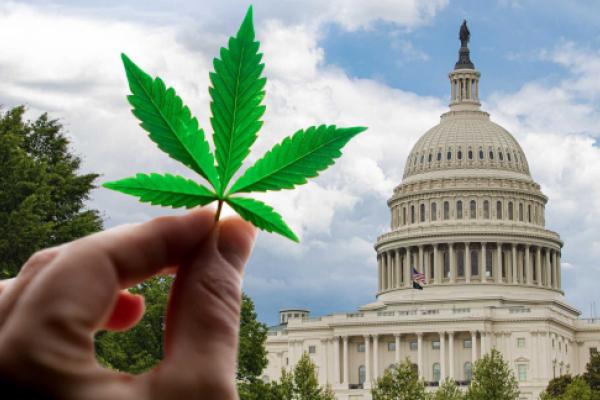Illicit Cannabis Undermines the Legal Market on a Large Scale: Who's to Blame? Ask Congress
Cannabis companies have been ready to launch their products for several years, gnawing away in fact. Cannabis consumers have been willing to buy their products for even longer, but they are tired of waiting, so they have turned to the illicit market.
When cannabis became legal in Colorado and Washington in 2012, then in Oregon and later in the 39 states that became legal, people flocked to stores and local dispensaries and queued for hours. But over the years and with exorbitant legal marijuana taxed and subject to a patchwork of state-by-state regulations, those who once stood in line are buying from traditional sellers who sell their products as they have for the past five decades. .
No way to treat a billion dollar industryLegal cannabis companies rightly complain that the unregulated market undermines the legal market, which also has the downside of still being considered illegal under federal law. One of the most onerous results of this US policy, in effect since the Controlled Substances Act (CSA) of 1970, is that state-legal cannabis companies do not have access to loans, capital, bank accounts and tax reform, to name a few obstacles.
Cannabis banking reform initiatives have been repeatedly defeated by Congress in recent years. The most recent was a last ditch effort by Senate Leader Chuck Schumer et.al. who had hoped for a lame Christmas miracle: the inclusion of the Secure and Fair Enforcement Banking Act (SAFE) in the $1.7 trillion funding bill. This did not happen.
"This is, unfortunately, a victory for the illegal market, which pays no taxes and has no regulations or safety testing in place," said Boris Jordan, co-founder and executive chairman of Curaleaf. CURA CURLF, adding that the whole industry will suffer.
Jordan got it right. Cannabis stocks fell sharply after the SAFE dump, pushing the sector even further from its peak in 2018-2019. The biggest losers in the few days following the disappointing Congress result were Cresco Labs CRLBF (-5.6%), Green Thumb GTBIF (-25.28%), Tilray TLRY (-19.6%) and Canopy Growth CGC (-17.44%).< /p>
Amanda Reiman of data, analytics and technology firm New Frontier Data confirmed that illicit cannabis sales "take a pretty high percentage of the potential market share", according to WNBC. Take New York City, for example, where none of its 36 newly licensed dispensaries have yet started operating, although one is scheduled to open on December 29.
New York farmers who have dutifully grown thousands of pounds of weed to supply what should be one of the largest cannabis markets in the country watch their crops rot while former weed vendors ply their wares via delivery trucks, bicycles, and even pop-up shops.
Despite the New York Office of Cannabis Management's cease and desist letters to unlicensed operators, they just aren't going away. Some say there are probably tens of thousands of illegal businesses in the Big Apple alone.
Although New Frontier does not collect data on illicit cannabis businesses in the United States, Reiman estimates that the marijuana black market is worth around $60 billion. The legally regulated industry is only half of that, she noted.
Rep. Ed Perlmutter (D-CO), a major sponsor of the SAFE Banking Act, Senator Sherrod Brown (D-OH) and Sen...

Cannabis companies have been ready to launch their products for several years, gnawing away in fact. Cannabis consumers have been willing to buy their products for even longer, but they are tired of waiting, so they have turned to the illicit market.
When cannabis became legal in Colorado and Washington in 2012, then in Oregon and later in the 39 states that became legal, people flocked to stores and local dispensaries and queued for hours. But over the years and with exorbitant legal marijuana taxed and subject to a patchwork of state-by-state regulations, those who once stood in line are buying from traditional sellers who sell their products as they have for the past five decades. .
No way to treat a billion dollar industryLegal cannabis companies rightly complain that the unregulated market undermines the legal market, which also has the downside of still being considered illegal under federal law. One of the most onerous results of this US policy, in effect since the Controlled Substances Act (CSA) of 1970, is that state-legal cannabis companies do not have access to loans, capital, bank accounts and tax reform, to name a few obstacles.
Cannabis banking reform initiatives have been repeatedly defeated by Congress in recent years. The most recent was a last ditch effort by Senate Leader Chuck Schumer et.al. who had hoped for a lame Christmas miracle: the inclusion of the Secure and Fair Enforcement Banking Act (SAFE) in the $1.7 trillion funding bill. This did not happen.
"This is, unfortunately, a victory for the illegal market, which pays no taxes and has no regulations or safety testing in place," said Boris Jordan, co-founder and executive chairman of Curaleaf. CURA CURLF, adding that the whole industry will suffer.
Jordan got it right. Cannabis stocks fell sharply after the SAFE dump, pushing the sector even further from its peak in 2018-2019. The biggest losers in the few days following the disappointing Congress result were Cresco Labs CRLBF (-5.6%), Green Thumb GTBIF (-25.28%), Tilray TLRY (-19.6%) and Canopy Growth CGC (-17.44%).< /p>
Amanda Reiman of data, analytics and technology firm New Frontier Data confirmed that illicit cannabis sales "take a pretty high percentage of the potential market share", according to WNBC. Take New York City, for example, where none of its 36 newly licensed dispensaries have yet started operating, although one is scheduled to open on December 29.
New York farmers who have dutifully grown thousands of pounds of weed to supply what should be one of the largest cannabis markets in the country watch their crops rot while former weed vendors ply their wares via delivery trucks, bicycles, and even pop-up shops.
Despite the New York Office of Cannabis Management's cease and desist letters to unlicensed operators, they just aren't going away. Some say there are probably tens of thousands of illegal businesses in the Big Apple alone.
Although New Frontier does not collect data on illicit cannabis businesses in the United States, Reiman estimates that the marijuana black market is worth around $60 billion. The legally regulated industry is only half of that, she noted.
Rep. Ed Perlmutter (D-CO), a major sponsor of the SAFE Banking Act, Senator Sherrod Brown (D-OH) and Sen...
What's Your Reaction?















![Three of ID's top PR executives quit ad firm Powerhouse [EXCLUSIVE]](https://variety.com/wp-content/uploads/2023/02/ID-PR-Logo.jpg?#)







